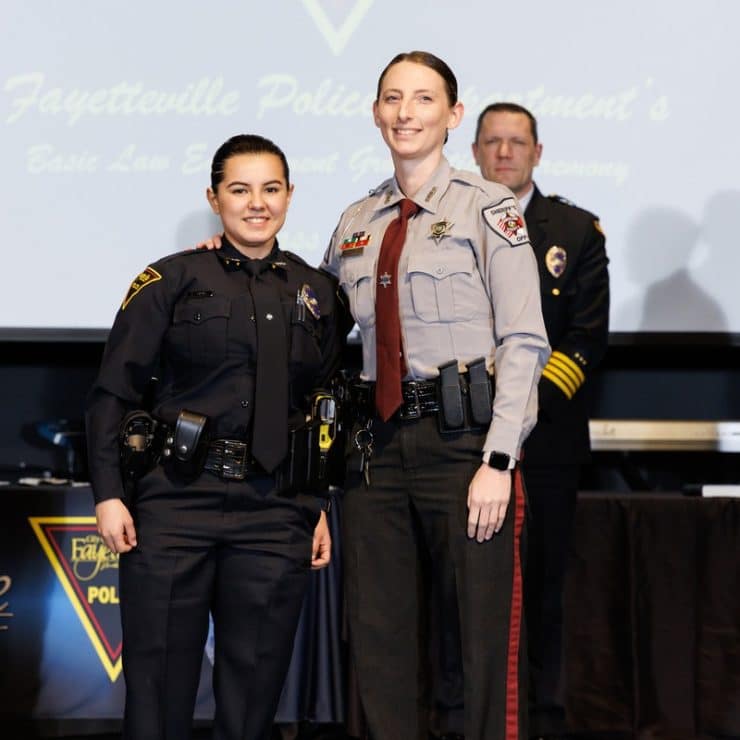
Methodist University’s Criminal Justice program has a history of preparing successful graduates, while offering flexibility across the board. The program is offered as an associate degree, bachelor’s degree, and minor with both on-campus and online modes of study. MU is also adding an online master’s program in Criminal Justice.
Responding to emergency calls, arriving to crime scenes, and enforcing the law are some of the many tasks recent Methodist University graduate Bertha Llamas takes on in her role as a police officer each and every day for the Fayetteville Police Department.
Llamas’ commitment to protecting the Fayetteville community is a responsibility she has worked hard for, but easily credits her education at MU for putting her in a position to succeed.
In fact, Llamas graduated from the police academy and earned her ranked as an officer less than a year after walking across Methodist University’s graduation stage in 2022 with a bachelor’s degree in Criminal Justice, Forensic Science (CSI), and Cybersecurity & information Assurance.
“All of Methodist University’s professors work with you to get as much exposure with the workforce without being in the field already – bringing in guest lecturers, helping us network, and giving us one-of-a-kind opportunities,” said Llamas. “But the Criminal Justice program really improved my writing. It prepared me for parts of the job that require a lot of reading, writing, studying, and using resources.”
Career-Ready Education
Methodist University’s Criminal Justice program has a history of preparing successful graduates like Llamas, while offering flexibility across the board. The program is offered as an associate degree, bachelor’s degree, and minor with both on-campus and online modes of study. MU is also adding an online master’s program in Criminal Justice.

From every degree type, the Criminal Justice program prepares students for a variety of careers.
“We’re giving students the ability to work anywhere in the justice system,” said Dr. Eric See, head of the Justice & Military Science Division and professor of Criminal Justice. “Most people think of law enforcement when they think of criminal justice, but that’s only a part of it. With this degree, students can also work in probation, parole, correction, legal law, or wildlife. There are even federal positions with the FBI, Secret Service, United States Capitol, and United States Supreme Court that are possible with this degree.”
Collaborative Learning
One of the many ways MU’s Criminal Justice program stands out from others in the region is its strong collaboration on projects with other programs – Forensic Science (CSI), Digital Forensics, Legal Studies, Psychology, and Sociology – helping students grow in numerous areas. The collaboration projects range from attending forensic science conferences to participating in mock trials at the Cumberland County Courthouse.
Criminal Justice students also have an opportunity to become published authors as undergraduate students. See – along with Assistant Professor of Justice Studies Sarah See and Director of Academic Support Rebecca King – work with the students to brainstorm, research, and write a book chapter. Most recently, Criminal Justice students helped publish “Guns 360,” a book that outlines different perspectives and common-sense approaches to firearms in America.

“I’m getting opportunities with the Criminal Justice program that I thought I never would have,” said Kaylee Williams, a junior majoring in Criminal Justice and Forensic Science (CSI) at MU. “It’s more than taking tests and getting a degree here, it’s giving me a real chance to put my name out here and build connections. The professors genuinely want us to succeed, and they care about you.”
Faculty-Led Connections
Not only do the Criminal Justice faculty offer a personal learning experience, as the University has a 12:1 student-to-faculty ratio, but they offer strong connections to the workforce, allowing students opportunities to pursue internships while in school and full-time jobs once graduated.
“Our graduates are placed all over the criminal justice system,” added Eric See. “We have alumni at the Bureau of Alcohol, Tobacco, Firearms, and Explosives, Fayetteville Police Department, Cumberland County Sheriff’s Office, North Carolina State Bureau of Investigation, Crimestoppers; and so much more. We have the sort of connections that allow us to pick up the phone, call our connections, and place students in a position of success. They just have to run with it.”
Flexibility of Online
MU’s Criminal Justice program is also unique from the perspective that it is also offered online – a great option for active-duty military, veterans, full-time workers, or anyone else needing the flexibility of online learning. Each course is eight weeks, allowing students to finish a bachelor’s degree in less than three years. The best part – online students receive the same instruction, attention to detail, and personal care from the same faculty that teaches MU’s on-campus Criminal Justice courses.
The demand for trained criminal justice professionals is growing to the point that Methodist University is now offering an online master’s program in Criminal Justice. While the program is new, Eric See and the Criminal Justice staff are excited about the direction of the program.
“Our online master’s program takes everything to the next level,” he said. “You will get a deeper understanding of the criminal justice system. The program is designed for people in the field who want to be promoted and need that master’s degree to earn a supervisory position. That could be anything from law enforcement officers looking to become chief officers to probation and parole officers wanting to reach executive positions.”
Whether someone is looking to enter the criminal justice system by earning an associate or bachelor’s degree or hoping to take the next step in their career with a master’s degree, Methodist University’s Criminal Justice program is the perfect place to engage, enrich, and empower.
“They bring everything to you so you don’t have to do all of the legwork,” said Williams. “They provide so many opportunities to you so if you have a chance to pursue this program, do it.”
To apply or learn more about the on-campus program, visit the Criminal Justice web page. You can also start your next chapter by learning more about our online program.